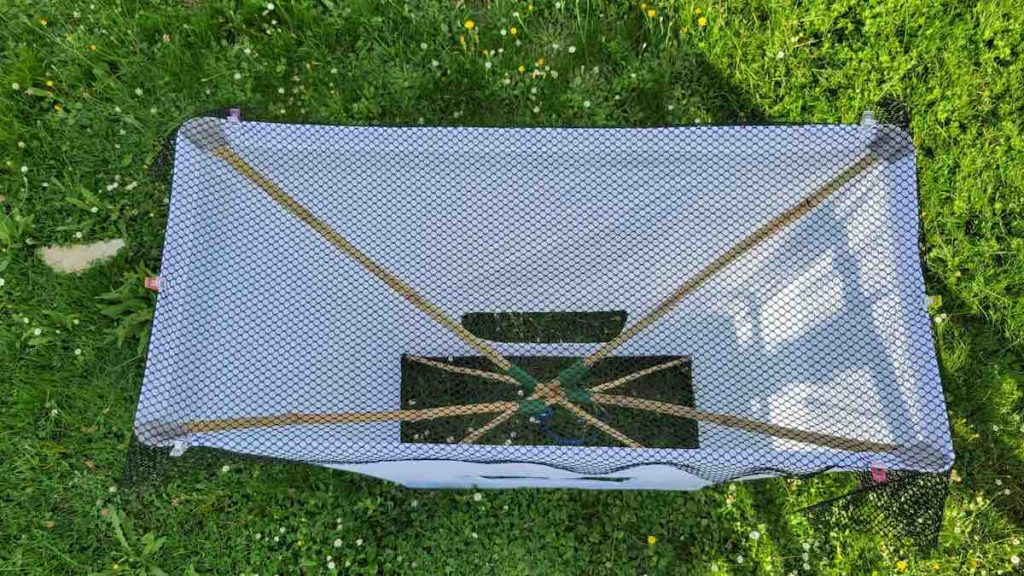In the last two decades, Asian hornets have invaded much of Europe. This situation represents a serious threat to beekeeping and biodiversity, as these invasive insects attack and destroy colonies of local bees and other pollinating insects.
Apicrosne’s Solution: An Anti-Hornet Tent
Apicrosne, a French company, has developed an innovative “anti-hornet tent.” This device not only acts as a physical barrier but also captures Asian hornets when they attack worker bees in front of their hives.
Easy and Practical Assembly
The assembly of this tent is straightforward. Beekeepers should follow the provided instructions or refer to an available assembly video. Four 59-inch long bamboo stakes are required, and a black mesh fabric with a diameter of 0.24 inches that is secured with clips included in the kit.

Installation
To correctly install the tent, place it against the front façade of the hive, aligning the bottom of its door with the bees’ flight platform.
An elastic band provided in the kit secures the tent to the hive. Additionally, a capture system is added to the top of the tent, which can include unbaited bottles or a capture box.
Operation
This invention functions as a real trap for hornets.
The trapped hornets will try to escape upwards and will be captured in the system. The bees, on the other hand, can freely exit through an opening at the front of the tent. If any bee strays upwards, it can easily escape through the mesh fabric.

The company recommends removing all other types of traps and components that may attract Asian hornets from the area around the hives.
Videos and reports show the effectiveness of these tents in capturing Asian hornets. Although customer feedback varies, many offer positive reviews. It is crucial to ensure proper installation for optimal results.
Asian hornets are a growing problem affecting both beekeeping and biodiversity in general.
More Information: apicrosne.com
The Problem with Asian Hornets
The issue with Asian hornets, specifically the Asian hornet (Vespa velutina), in Europe is significant and concerning. These hornets are non-native invaders introduced accidentally in France around 2004 and have since rapidly spread across several European countries. They present a serious threat to native bees and beekeeping due to their predatory behavior: they hunt bees and other pollinating insects, which can devastate bee colonies and affect pollination and biodiversity.

Furthermore, the presence of these hornets creates challenges for beekeepers, who must implement measures to protect their hives. Efforts to control and mitigate their impact include creating traps and developing methods to detect and destroy their nests. However, their rapid expansion and adaptability make controlling this invasive species a complicated and ongoing task. The concern is not only focused on beekeeping but also on the general ecological balance, as the reduction of bee populations and other pollinators can have cascading effects on ecosystems.
What Attracts Asian Wasps?
Asian wasps can be attracted by a variety of factors, such as the smell of food, body odor, and certain chemical products. They are often drawn to food, especially raw meat and sweet foods, and can be a nuisance in outdoor areas where cooking or eating is taking place. They can also be attracted to body odor, particularly when people are sweating, and may fly toward exposed skin to sting.
Additionally, Asian wasps can be drawn to the smell of certain chemicals, such as perfumes and cleaning products. These scents can remind them of flower or nectar aromas, making them fly towards them in search of food. It is important to be careful when using chemical products outdoors or in areas known to have Asian wasps, as they can attract them and increase the risk of being stung.
What Does Asian Hornet Venom Do?
Asian hornet venom is a toxic substance produced in the hornet’s venom glands and used for defense and hunting. Asian hornets, also known as honey hornets, are an invasive species originating from Asia and have spread worldwide. Although Asian hornet venom is less potent than that of the European hornet, it can still be dangerous to people and animals.
When an Asian hornet stings a human or animal, it injects venom into the skin through its stinger. The venom contains several toxic substances, including polypeptides and histamine. These substances can cause pain, swelling, and redness at the affected site, as well as systemic symptoms such as dizziness, difficulty breathing, and changes in heart rate. In severe cases, Asian hornet venom can cause anaphylactic shock and can be fatal.
Asian Hornet vs. European Hornet
Asian and European hornets are two different species of hornets that belong to the same insect family, Vespidae. Although both species look similar in some aspects, there are some key differences between them.
One of the main differences is size. Asian hornets are generally larger than European hornets, which have a slimmer and elongated body.
Another difference is behavior. Asian hornets tend to be more aggressive than European hornets and can attack without warning if they feel threatened. European hornets, on the other hand, are usually more reluctant to sting and only do so if provoked or agitated.
In general, it is important to exercise caution around both species of hornets and avoid disturbing or provoking their colonies.



















